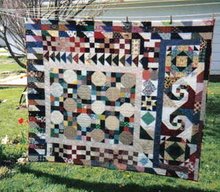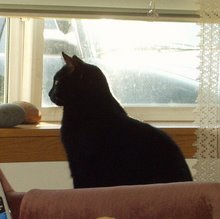
"The Orphan Train, Heading West" is my personal creation. The odd, unwanted, extra "stuff" is not so different from thousands of children rounded up in New York City, Washington DC, Chicago and other large cities, and sent west. They were placed on a train that stopped in many of the small towns along the way.
The town folks gathered on railroad platforms or in churches, to see if there was a child that they could/would take "home". This is NOT fiction, nor a story, the Orphan Train traveled back and forth, from the late 1850's, until the 1930's, removing orphaned and unwanted children from city streets. The street kids were a by-product of the huge immigration(to America)from Eurpose. Immigrant parents found this wasn't a land where streets were lined with gold after all. Many children were forced out of the homes and onto the streets as the family size grew.It was sink or swim, take care of yourself or perish. As a human being, I have strong feelings about this, and being an adoptive parent doubles those feelings. Unwanted children.

There are thousands of websites about aspects of The Orphan Trains. Many are on a "state by state" basis. There are actual records of children who rode those trains, and sometimes interviews with them as adults. You know that someone who rode in the 1920's or 1930's could very well be alive yet today. There was just ONE Orphan Train. Many actual engines and cars were used over those 70 years, but the 'concept' belong to Rev. Charles Brace who founded the Children's Aid Society. Other orphanages were involved in placement and in gathering children to be cleaned up, fed and sent west. Children were "gathered in", taken care of in orphanages and "held" until there were enough to fill the train. Several sponsors were needed to ride west and supervise the children along the way. They were also the 'records' keepers from town to town.
I don't want anyone who reads this blog, to TRIVIALIZE,in any way, the very seriousiness of The Orphan Train. Nor the aspect of what was decided for these children by our society. I believe, that like adoption today, it's the "least worst" solution to the circumstances. In the wealth of our nation today, it's easy to become immune to the faces and needs of the less fortunate. Easy to let "someone else" take care of it. I'm endorsing the gathering up and gentle using of the quilt blocks we find just 'littering' our boxes and baskets. The 'moving' them into a more suitable and useful setting, but NOT FOR A MOMENT, do I forget that the Orphan Train of history was a REAL DEAL.
We'd have to make alot of quilts to come close to the 150,000 to 200,000 children that were moved across America in those 70+ years.
 This last picture if a map of the USA, of course. The lines indicate the routes of and cities included in the gathering, carrying and moving of those children.
This last picture if a map of the USA, of course. The lines indicate the routes of and cities included in the gathering, carrying and moving of those children.I spent much time reading, the past night or two, at Orphan Train web sites. I noticed that Minnesota(my neighbor) took in over 3,000 of these children. Wisconsin took 2,000 plus. Oregon took 19. Poplulation and farming seemed to play a role in how many found home in a particular state.The children ranged from infant to young adult.
Many of the websites EMPHASIZE that these children were only 'half' orphan..that they had parents in many cases who couldn't care for them. I don't thinka definition of actual status is the point. I believe you can be a 'motherless child' while having a living mother, and you can be an orphan in the sense that you are unwanted, or found to be 'wanting' in some way. My quilt blocks are orphans in their unsuitable, not beautiful enough, imperfect ways.....but every one of them has a use.





10 comments:
I have read some of these stories and how siblings were seperated, some searched for years to find their little/older brothers/sisters to no avail; and others were successful in their searches. Actually, I think Anne of Green Gables was an orphan picked up at a train station? - not sure anymore because it was years ago that I read the book. But I do remember that the family had wanted a boy to help with the farm work, not a girl!
Evelyn
Hi Finn,
I appreciate how much you respect the historical reality of the Orphan Train in the lives of poor children. It is indeed a complicated and often sad story. I think you do a good job of explaining the connections and the differences of the orphan block quilts and the original orphan train.
I had no idea about this part of our history, Finn. What a sad, sad situation. It's very touching. Thanks for sharing this with us. I've said it before and I'll say it again, I love that quilt of yours!
Well said, Finn! You know I researched this alot after you started your website..and the stories and the pictures both touched and troubled me. I have friends who connect deeply with trains and one who not only connects but has felt like an orphan her whole life...so in that sense I know and relate to Orphan Train children. As you said, many have families but are still orphans...even today. Your intensity only strenghtens our understanding of the committment, Finn. When we make an Orphan Train quilt, we should feel some of the meaning in its origin...our blocks do stand for something of value cast aside and not used and in the using we create value, a place and a 'home' just as the families did for the children. I do understand your heart in this, and I think more and more of us will. I think the reason your own quilt turned out so exceptionally and so truly beautifully that it was just meant to be a tangible symbol of beauty and worth to all of us!
beautifully said.
Touchingly eloquent once again Finn.
My grandmother, Marjorie Peterson, was an orphan train rider. She was indentured as a nanny by a family in MN at the age of 8. The family changed her name from Mary to Marjorie. In her middle years, Grandma wrote her autobiography, which my family knew, but it remained private until her death in 1991 (age 93). I made a quilt in Grandma's memory and use it when I read from her autobiography and tell her heartwarming story to audiences (including quilt guilds!) across the US. An article that I wrote about the orphan trains and her story was published in "Quilters Newsletter Magazine," Jan/Feb 2005. Read the article, see my "orphan train" quilt and learn more on my website at www.crocuslanequilts.com. My book "They Named Me Marjorie" was published in June 2006.
Interesting note: The term "orphan train" is somewhat misleading because Charles Loring Brace/Children's Aid Society and other placement agencies never used this term for their placements but rather The Home Finding Department or Emigration Department. Almost one-third of the children from the CAS may have been placed in New York and never rode a train. The Foundling Hospital sent out "baby" or "mercy" trains. The term orphan train may have been coined as recently as 1978 when CBS aired a miniseries called "The Orphan Trains." Nonetheless, the period from 1854 to 1929 (75 years!)and the adoption/indenture/foster care placement of an estimated 250,000 children was the most significant movement of children in the US and was the genesis of American adoption and foster care programs.
Thank you so much for posting about this. My great grandmother was adopted as an older child. She never spoke about the details, but I do know her original last name. Just out of curiosity I googled orphan train and our home town, and it turns out that many of the kids ended up there. There is a real possibility that my great grandmother rode the "orphan train", and I plan to try to do some research into this now. As an adoptive mom myself, this is so important to me on so many levels. Thank you!
Beautifully said Finn -- my grandmother was adopted during this time. While I don't think she actually rode the train, she was one of many children of immigrants who were adopted because their parents could not care for them. Anyone who would doubt that this train did exist or the issue of adoption during this period was not factual just needs to look it up. It's been well documented. And your words add to the story -- beautifully!
Hi Finn! I just received the book in the mail from my friend Eileen. Is there a list of potential readers I should pass it on to when I'm done, or should I post about the book on my blog and link back to yours to see who wants it next?
This post of yours where you talk about orphans in the sense of being unwanted touched my heart. I was adopted at birth and although my adoptive dad (who passed away last year) was a sweetie, my adoptive mom is an alcoholic and has always been emotionally withdrawn; so, even though I was adopted early on, I still felt "orphaned" much of the time. Needless to say, I'm looking forward to reading the book. Thanks!
Post a Comment